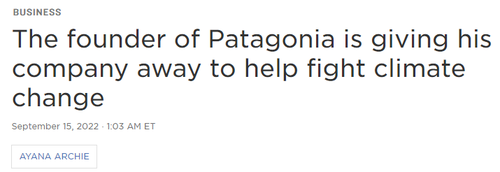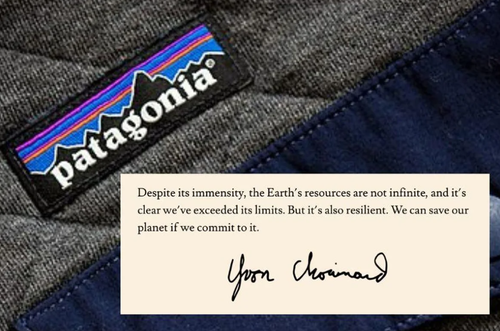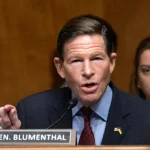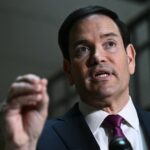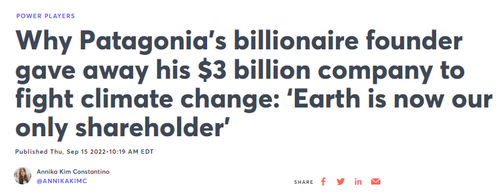
Now that the mindless lemmings in the mainstream media have finished gushing over the idea that Patagonia's founder, Yvon Chouinard, was giving up all of his company's profits for benefit of fighting climate change, the reality of the situation can finally start to make its way out.
No doubt you saw a headline somewhere this week praising Yvon Chouinard for forfeiting ownership of his company and giving away its profits to a "charity fighting climate change". There were no shortage of liberal "I told you so's" being passed around on social media, citing Chouinard as some type of living proof that capitalism is evil and that everything will eventually revert to a Marxist utopia where all profits are collectively shared for the greater good.
Here's CNBC's headline from this week, writing that "Earth" was now Patagonia's only shareholder:
And of course, NPR gushed similarly:
That was, of course, until Bloomberg dropped a reality check on the situation late in the day on Thursday with the pesky facts behind exactly how Chouinard was setting up the transfer of his company.
Hilariously, the same lot praising the move to "fight climate change" are often those advocating that billionaires pay their "fair share" in taxes. Which is why it was really funny when, late in the day on Thursday - after the love fest for Chouinard had fully run its course - Bloomberg dropped the not-so-gushy headline that Chouinard was actually skirting $700 million in taxes by how he structured the transfer of his firm.
Oops!
And to make matters worse, the move was also structured in a way that allows Chouinard and his family keep control of the company while they protect it from tax bills that "could have totaled hundreds of millions of dollars," the report says.
"Chouinard seems to have structured his Patagonia transfer with at least a few purposes in mind," Bloomberg writes, noting that the receiving company is a 501(c)(4), which allows it to make "unlimited political donations" unlike a 501 (c)(3).
The moves also mean that "Chouinard won’t have to pay the federal capital gains taxes he would have owed had he sold the company", the report says. That would have been about $700 million on a $3 billion company sale. Additionally, he also avoids the U.S. estate and gift tax, which would have been a 40% chunk of change when his company was transferred to its heirs.
Ray Madoff, a professor at Boston College Law School, commented: "We are letting people opt out of supporting all the expenses of government to do whatever they want with their money. This is highly problematic from the point of view of democracy, and it can mean a higher tax burden for the rest of Americans.”
Ellen Harrison, a tax attorney at McDermott Will & Emery in Washington, confirmed that using a 501 (c)(4) allows Chouinard and his family continue to effectively control the company.
She concluded: “I suspect the driver was trying to preserve the company. Founders often 'almost view these companies as part of their family.'"
So, uh, how many trees did we save today?
Now that the mindless lemmings in the mainstream media have finished gushing over the idea that Patagonia’s founder, Yvon Chouinard, was giving up all of his company’s profits for benefit of fighting climate change, the reality of the situation can finally start to make its way out.
No doubt you saw a headline somewhere this week praising Yvon Chouinard for forfeiting ownership of his company and giving away its profits to a “charity fighting climate change”. There were no shortage of liberal “I told you so’s” being passed around on social media, citing Chouinard as some type of living proof that capitalism is evil and that everything will eventually revert to a Marxist utopia where all profits are collectively shared for the greater good.
Here’s CNBC’s headline from this week, writing that “Earth” was now Patagonia’s only shareholder:
And of course, NPR gushed similarly:
That was, of course, until Bloomberg dropped a reality check on the situation late in the day on Thursday with the pesky facts behind exactly how Chouinard was setting up the transfer of his company.
Hilariously, the same lot praising the move to “fight climate change” are often those advocating that billionaires pay their “fair share” in taxes. Which is why it was really funny when, late in the day on Thursday – after the love fest for Chouinard had fully run its course – Bloomberg dropped the not-so-gushy headline that Chouinard was actually skirting $700 million in taxes by how he structured the transfer of his firm.
Oops!
And to make matters worse, the move was also structured in a way that allows Chouinard and his family keep control of the company while they protect it from tax bills that “could have totaled hundreds of millions of dollars,” the report says.
“Chouinard seems to have structured his Patagonia transfer with at least a few purposes in mind,” Bloomberg writes, noting that the receiving company is a 501(c)(4), which allows it to make “unlimited political donations” unlike a 501 (c)(3).
The moves also mean that “Chouinard won’t have to pay the federal capital gains taxes he would have owed had he sold the company”, the report says. That would have been about $700 million on a $3 billion company sale. Additionally, he also avoids the U.S. estate and gift tax, which would have been a 40% chunk of change when his company was transferred to its heirs.
Ray Madoff, a professor at Boston College Law School, commented: “We are letting people opt out of supporting all the expenses of government to do whatever they want with their money. This is highly problematic from the point of view of democracy, and it can mean a higher tax burden for the rest of Americans.”
Ellen Harrison, a tax attorney at McDermott Will & Emery in Washington, confirmed that using a 501 (c)(4) allows Chouinard and his family continue to effectively control the company.
She concluded: “I suspect the driver was trying to preserve the company. Founders often ‘almost view these companies as part of their family.'”
So, uh, how many trees did we save today?
